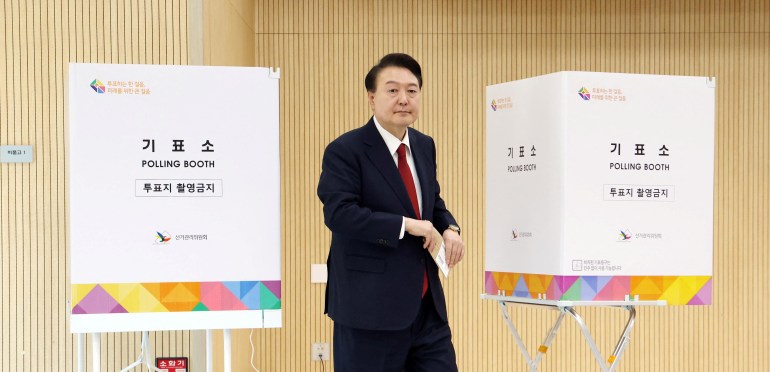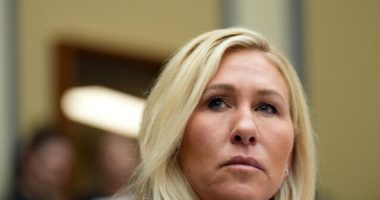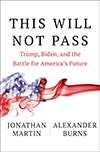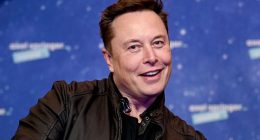South Koreans will head to the polls on Wednesday to choose who will sit in the country’s 300-member parliament in a major political test of conservative President Yoon Suk-yeol.
Yoon was elected leader two years ago with the slimmest margin of victory in any presidential election, defeating Lee Jae-myung of the Democratic Party by 0.73 percent.
His approval ratings remain low amid an acrimonious doctors’ strike, rising food prices and allegations of corruption, which could spell trouble for his People Power Party.
But the Democratic Party is not much more popular, with Lee facing corruption charges.
The National Assembly, as the parliament is known, is currently controlled by the Democrats, and whoever wins the April 10 vote will be in a position to set the tone for domestic politics over its next four-year term.
Here is all you need to know about the elections:
Why does the election matter?
The election comes with Yoon enduring months of low approval ratings, and can be seen as a “half-term assessment” of his administration, according to the US-based Stimson Center.
If the PPP performs poorly or is unable to claim a majority in parliament the president is likely to lose further momentum in his final three years in office. South Korean presidents serve only a single term.
“With the opposition-led parliament, it has been hard to make a policy push or achievement over the last two years. Without change during the rest of his term, it would be extremely hard to do his job,” said Lee Jun-han, professor of political science at Incheon National University.
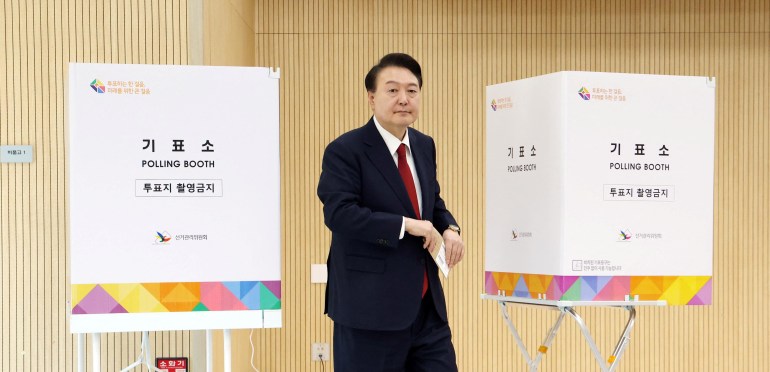
Whatever the outcome, the election is unlikely to have much of an effect on the country’s foreign policy, however.
Yoon has sought to deepen its political and military ties with Japan and the United States amid bellicose talk from Pyongyang, which has been testing new weaponry and developing closer relations with Russia.
What are the main parties?
The PPP and Democratic Party have dominated South Korean politics for years.
As of March 2024, the National Assembly had 297 members out of a total of 300 seats. The DP held the most seats with 160, followed by the PPP with 113.
There are also a number of smaller parties, some of them set up by breakaway factions of the established parties.
More than 20 percent of voters said they would vote for the newly-launched Reform Korea party under former justice minister Cho Kuk via the proportional representation vote, according to a Gallup poll released on March 29.
That could give the party between 10 and 15 seats, and perhaps make them a kingmaker in the new parliament.
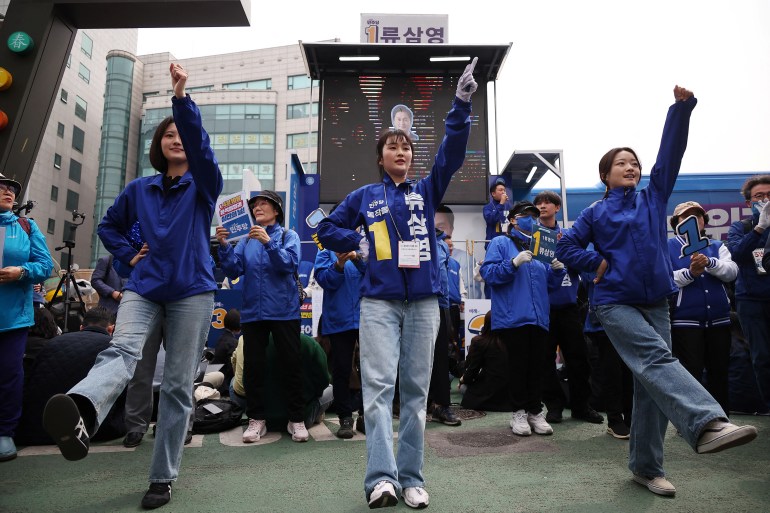
What are the key issues?
Opinion polls suggest the cost of living and rising food prices are key issues for voters.
Yoon and his party felt the heat after a visit to a supermarket last month when he tried to promote government efforts to tame prices by talking about the price of green onions.
Looking at a bundle of onions with a price tag of 875 won ($0.65) – a discounted price as a result of a government subsidy – Yoon said he thought the price was “reasonable”.
The comment gave plenty of fodder to the opposition – the average retail price for green onions has been hovering between 3,000 won and 4,000 won ($2.20 to $2.90) – with candidates for the Democratic Party brandishing onions at campaign rallies and accusing Yoon of being out of touch.
It is not just onions that have surged in price, either. Prices of agricultural products increased by more than 20 percent in March from the same month last year. The price of apples surged nearly 90 percent, marking the largest one-year jump since 1980.
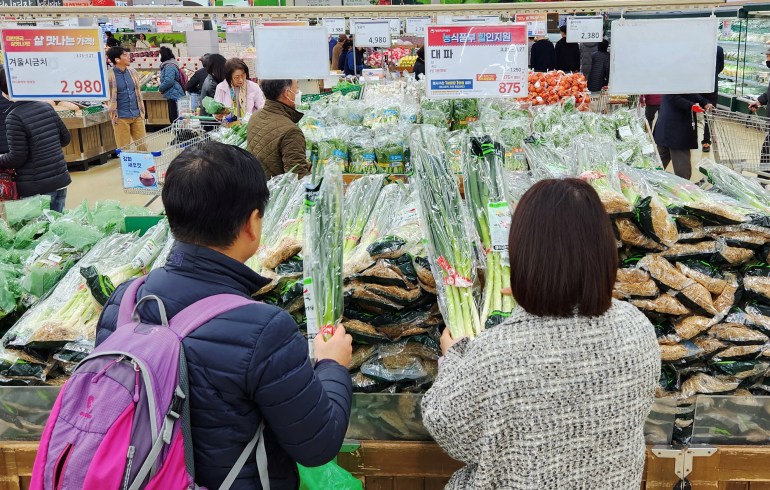
Voters are also concerned about a weeks-long strike by thousands of doctors angry over plans to reform medical education, which has forced operations to be cancelled and increased waiting times. Yoon has refused to budge, but opinion polls suggest increasing public support for a compromise to end the dispute.
Corruption also remains a major issue.
Yoon is under pressure over the so-called “Dior bag scandal” after footage surfaced last November showing his wife accepting a $2,200 designer handbag. Yoon has dismissed the video as a “political scheme” but such a gift would breach South Korean law banning public officials and their spouses from accepting anything worth more than $750.
He is also facing the heat over his decision to appoint former defence minister Lee Jong-sup as the country’s ambassador to Australia while being under investigation for corruption. Lee resigned on March 29 less than a month after an outcry, not only among the opposition but also within the PPP.
The Democratic Party also has its own struggles with corruption. Leader Lee is facing trial over charges including bribery.
Cho also has baggage.
A rising political star during the government of Yoon’s Democratic predecessor, Moon Jae-in, he faced a slew of scandals that undermined his reformist image and sharply split the nation. In February, a court sentenced him to two years in prison for forging documents for his children’s university admission, and he has one last appeal.
And what will not be an issue? North Korea.
Despite all its weapons tests and moves to end all forms of cooperation with South Korea, most voters are inured to the rumblings from across the border.
The “widespread public feeling towards North Korea is pity, not fear,” political consultant Bae Kang-hun told the AFP news agency, noting the South Korean economy is about 40 times larger than North Korea’s.
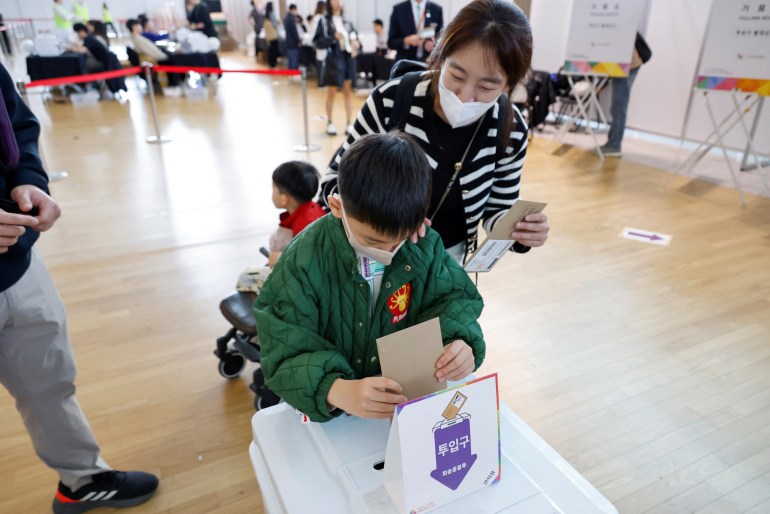
How does the election work?
Polling stations open at 6am (21:00 GMT) across the country and close 12 hours later.
Thousands queued for early voting on Friday and Saturday, suggesting turnout could be high on Wednesday. There are some 44 million voters.
South Korea uses a mixed-member system of proportional representation, which was introduced in 2020.
Under this system, voters cast two ballots: one for their local district (254 seats) and another for a political party. The proportion of votes received by each party is used to allocate the 46 remaining seats, and is meant to ensure better representation for smaller parties.
Although there is a stark political divide between the conservatives and liberals, experts say between 30 and 40 percent of voters could be undecided.
Even if conservatives and liberals intensely bicker over political issues, that won’t influence election results much, Choi Jin, director of the Seoul-based Institute of Presidential Leadership told the Associated Press news agency. “The fate of an election is rather determined by the moderates who silently monitor livelihood issues and decide who to vote for.”
Read More: World News | Entertainment News | Celeb News
Aljazera

